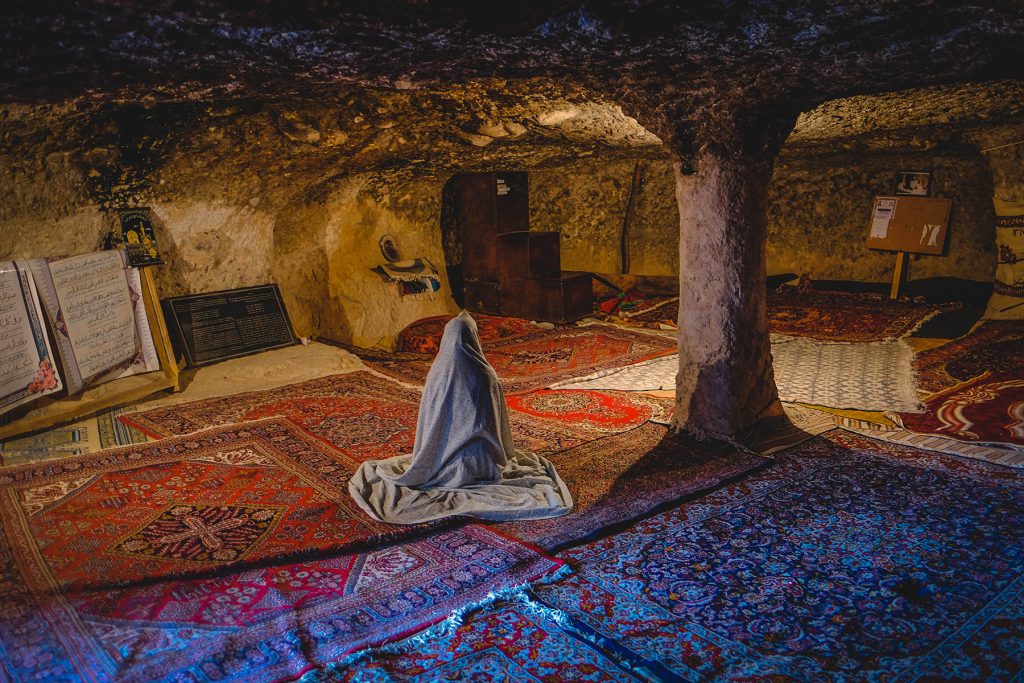Traveling to Iran during Ramadan for non-muslims can be a tough decision to make. Especially now that Ramadan has fallen right in the middle of spring – the best time to travel to Iran. This post is meant to put everything on the table and give you a realistic idea of what traveling to Iran during Ramadan would be like
– Is it worth it? That’s something you’ll decide at the end of this article.
What is Ramadan and when does Ramadan in Iran start?
Ramadan is a holy month for all Muslims around the world. Whether Shia or Sunni, all Muslims celebrate Ramadan by fasting from dawn to dusk for 29-13 days depending on the lunar cycle. The start of Ramadan for both Shias and Sunnis is pretty much the same, except that Shias believe that Ramadan starts on the day that the moon is seen with a naked eye and it ends on the day that it’s no longer seen in the sky. The naked eye thing is basically the whole difference which could sometimes shift the start of Ramadan a day later for Shias.
As for 2019, Ramadan will start on May 7th and probably end on June 6th in Iran.

What is fasting during Ramadan like?
Fasting during Ramadan basically means no eating, drinking, swearing, negative thoughts, sex, and generally wrong deeds from sunrise to sunset. It’s supposed to remind people of the underprivileged so that they would extend their help and support to those in need. It’s about being charitable, self-conscious and aware of the people around you. It’s not an easy thing to do and whoever says otherwise is basically lying, especially when it’s during long hours and scorching heat.
People who fast do it out of devotion to God and there’s a stronger community atmosphere during this time.
Who’s supposed to fast during Ramadan?
Every Muslim should start practicing after they hit puberty. Now the Muslim clergies have different ideas about the exact age of puberty for girls and boys. It can be anything from as early as 9 to 13 for girls and usually around 15 for boys. Children under that age, the elderly, the sick and travelers are exempted from fasting.
Things you should know about Ramadan in Iran
Iftar: Iftar is the big feast after a full day of fasting. Serving food or iftar to a fasting Muslim is considered as an act of worship itself, so it’s common to get invited to other people’s houses for iftar. Iftar in Iran is usually a two-course meal. People usually break their fast with dates, tea, cheese, vegetables and a variety of sweets and soups made especially during Ramadan. After the first round, the proper Persian food comes on the table with rice, stews, salads and more.
Read more: 6 PERSIAN FOOD YOU MUST TRY DURING RAMADAN IN IRAN + RECIPES
Sahari (Sahur): Sahari in Farsi is the meal eaten right before sunrise. It’s basically to stock up on some calories for the long day of fasting. Some families tend to stay awake right until the morning prayers (before sunrise) and eat Sahari just before they pray. Others would sleep and wake up an hour before sunrise to have Sahari. For some people, Sahari is mostly like breakfast with a lot of water to keep you hydrated for the day. Others like to have a whole meal, so there’s really no rule for it.
Eid-al Fitr: Eid-al Fitr is a 2-day celebration in Iran after Ramadan ends. There’s a big Fitr prayer that takes place on the first day of Eid on the streets of all cities of Iran. It’s when Muslims pray together for having passed another year of Ramadan. Eid-al Fitr usually involves a lot of eating and many Iranians take the opportunity to travel.
Roozeh: Roozeh means fasting in Farsi. So if you hear someone saying it, you’d know they’re fasting. 😉
Qods Rally: The Qods Rally occurs on the last Friday of Ramadan. It’s an annual event initiated after the revolution in support of Palestine and opposing Zionism. It’s basically a big government sponsored demonstration which happens all around Iran by some people.

What’s traveling to Iran during Ramadan like?
Iran is officially an Islamic Republic and Islamic laws are observed a lot more seriously than many Muslim countries. I traveled once to Istanbul during Ramadan and nothing seemed to be any different apart from the flock of picnickers after sunset.
Iran, however, is a little different. You’re basically not supposed to be eating or drinking in public. Restaurants within the city are supposed to be closed or only offering cold sandwiches. Swimming pools work at night shifts and cafes are all closed during the day.
This can be quite tough for foreign travelers. Especially when you have to be sneaky about drinking or eating outside.
Like the rest of the world, religious practices are also becoming loose among Iranians. You’d meet many non-practicing Muslims in Iran who’d care the least about Ramadan and are probably even angry by the restrictions (and for a good reason). I’ve seen people eat, drink and even lick on ice creams in the streets of Iran during Ramadan. I’ve seen water bottles sold in the street during traffic jams and many of my former colleagues eat in the office.
As a practicing Muslim and someone who fasts in Ramadan, I don’t care a bit if anyone eats in front of me. I don’t get tempted, because that’s just ridiculous and I don’t really feel more hungry by it. Many people I know are the same. Others, however, find it disrespectful and appreciate some consideration which is understandable. But apart from all this, it’s really the law in Iran that requires you to act a certain way during Ramadan.

But apart from all the cons of traveling to Iran during Ramadan, there are a few positive aspects to it as well.
Pros of traveling to Iran during Ramadan:
- It’s low season. There are very few tourists, accommodations are empty and tours and excursions are hardly sold. This means you get most attractions to yourself and pay less on hotels or activities.
- People tend to get a lot more generous during Ramadan and there’s a big chance you’ll get invited to an iftar feast.
- Iran’s best nightlife scene is witnessed during Ramadan. Most restaurants, cafes, and shops are open way past midnight. Parks are filled with picnickers and big cities are well alive into the night.
Preparing for Ramadan in Iran
- As a foreigner and traveler, people understand that you’re not fasting but you’re still expected to not eat publicly.
- No ice cream licking in the street.
- You won’t be getting any food or snacks on the plane, bus or train during fasting hours.
- Make sure you have snacks in your bag in case it was difficult to find an open restaurant.
- There won’t be many fresh or warm meals available at restaurants during the day.
- Take advantage of the nightlife and stay awake.
- Supermarkets are all open during the day so you won’t have any problem to buy water or snacks.
Should I travel to Iran during Ramadan?
Now, this is really up to you but I personally think that if you have the chance, it’s best to avoid Ramadan all together. For one thing, you’ll be missing out on a big part of the Persian food scene and you won’t be able to stop for a drink anywhere you please.
However, if you’ve already booked your flight and can’t make alterations, don’t be too pessimistic about it. You won’t be going hungry by any chance and things are not as strict as they sound. Just enjoy your holiday and take advantage of the perks of Ramadan.



Dear Matin:
Thank you for such an useful and insightful article about Ramadan and travelling to Iran during those dates. I already have booked my flight and it will be during those days. Hopefully, I won’t have any problems for finding food in the places I’ll visit there.
Pingback: Religión y festividades en la cultura árabe - Tendencias Deportivas
Pingback: Religión y festividades en la cultura árabe - Últimas Noticias Caracas
Pingback: Religión y festividades en la cultura árabe por dateando.com - Ultimas Noticias Venezuela
Pingback: Religión y festividades en la cultura árabe por dateando.com - Zona Conciertos